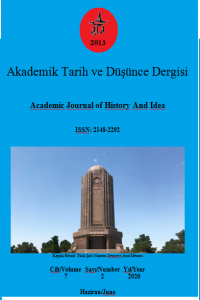The Non-Cosmopolitan Erasmus: An Examination of his Turkophobic/Islamophobic Rhetoric
Erasmus despised the Turks, their achievements, and their religion, at a time when the Ottoman Empire was at its peak under Sultan Suleiman I (the law giver; the Magnificent). However, as a rule Turkophobia/Islamophobia been passed over by scholars and writers. Stephen Zweig, an important biographer, and Johan Huizinga, the prominent historian, both admirers of Erasmus, are by no means the only ones to ignore it. Another important historian, Heiko Oberman, was exceptional in claiming that Erasmus had little patience with the modern ideal of toleration, whether religious or ethnic. However, Oberman focused on Erasmus’ anti-Jewish rather than his anti-Turkish/Islamic attitudes. In this study Oberman’s arguments are supplemented by analyzing Erasmus’ rhetoric concerning the Turks and Islam, concluding that Erasmus was captivated by the intolerant Eurocentric spirit of his time even more than Martin Luther.
Anahtar Kelimeler:
Erasmus, Luther, Islamophobia, Turkophobia
Gayri-Kozmopolit Erasmus: Erasmus’un Türkofibik/İslamofobik Retoriğine dair Bir İnceleme
Erasmus, Osmanlı Devleti’nin Sultan Süleyman (Yasa getirici/Kanuni; Muhteşem) döneminde zirvede (en parlak devrinde) olduğu bir zamanda, Türkleri, başarılarını ve dinlerini küçümsemiştir. Bununla birlikte, umumiyetle, Türkofobi/İslamofobi, bilim insanları ve yazarlarca es geçilmiştir. Her ikisi de Erasmus’un hayranı olan, önemli bir biyografi yazarı Stephen Zweig, ve önde gelen bir tarihçi Johan Huizinga, tabiki de bunu görmezden gelen yegane kişiler değildir. Başka bir önemli tarihçi Heiko Oberman, Erasmus’un, ister dini isterse etnik olsun, modern hoşgörü idealine karşı az sabrı olduğunun iddia edilmesinde müstesna olmuştur. Bununla birlikte, Oberman, Erasmus’un Türk/İslam-karşıtı tutumlarından daha ziyade onun Yahudi-karşıtlığına odaklanmıştır. Bu çalışmada, Oberman’ın argümanlarına, Erasmus’un Türkler ve İslam ile ilgili retoriği analiz edilerek, ilave yapılmış ve Erasmus’un hoşgörüsüz Avrosantrik (Avrupa merkezli) ruhla Martin Luther’den bile daha fazla büyülendiği sonucuna varılmıştır.
Keywords:
Erasmus, Luther, İslamofobi, Türkofobi,
___
- WEILER, A. G., “The Turkish Argument and Christian Piety in Desiderius Erasmus’ 'Consultatio de Bello Turcis inferendo' (1530),” in J. Weiland Sperna and W. Th. M. Frijoff, eds., Erasmus of Rotterdam the Man and the Scholar, Leiden: Brill, (1988): 30-39.
- ZAGORIN, P., How the Idea of Religious Toleration Came to the World, Princeton: Princeton University Press, 2003.
- ZWEIG, S., Erasmus of Rotterdam trans. Eden and Cedar Paul, New York: Viking Books, 1934; repr. Plunkett Lake Press, 2015.
- Yayın Aralığı: Yılda 6 Sayı
- Başlangıç: 2013
- Yayıncı: Hakan YILMAZ
Sayıdaki Diğer Makaleler
Sanat, Estetik Tefekkür Alanı ve Eleştiri
Oryantalistlerin Hz. Muhammed’in Hayatına Yaklaşımlarına Dair Bazı İncelemeler
Savaş Filleri ve Mürettebatının Silahları
Eğitim ve Öğretimde Türkçenin Felsefesinin Yeri ve Önemi Üzerine
Kamil Veli NERİMANOĞLU, Selman ARSLANBAŞ, Aysu GÜZEL
Avrupalı Türklerin Yabancı Düşmanlığına ve Asimilasyona Karşı Kimlik Mücadelesi
Eski Mezopotamya Çivi Yazılı Kaynaklarında Kısırlık ve Çocuk Düşür/t/me
